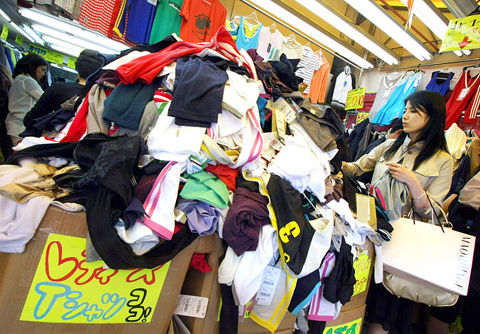Japan’s retail sales dipped 2.9 percent last month, falling for the eighth straight month, as consumers stayed cautious amid growing jitters about jobs and wages.
Sales at big retailers — a narrower category that includes supermarkets and department stores — fell 6.7 percent from a year earlier in the 13th straight month of retreat, the Ministry of Economy, Trade and Industry said yesterday.
The figures underscore how the nation’s steepest recession since World War II is now extending its reach to workers and households.

PHOTO: BLOOMBERG
Like its Asian neighbors, Japan has been battered by the unprecedented collapse in global demand triggered last year by the US financial crisis. Manufacturers such as Toyota Motor Corp and Sony Corp have had to suspend production, cut thousands of jobs and reduced wages.
Toyota, the world’s biggest automaker, said yesterday its global vehicle production tumbled 46.5 percent last month from a year ago to 433,979 vehicles amid few signs of relief for the beleaguered industry.
Honda Motor Co, the nation’s No. 2 automaker, fared slightly better because of strong sales of its Insight hybrid and Fit subcompact in Japan, where Honda’s sales last month rose for the first time in six months.
Honda made 231,399 vehicles last month, down 29.7 percent on year and marking the sixth straight month of on-year decreases that began in November.
Nissan Motor Co, allied with Renault SA of France, saw its production decline across the globe, except for China, and made 183,248 vehicles worldwide last month, down 38.2 percent from the same month the previous year.
Global production for Mitsubishi Motors Corp last month totaled 46,289 for the 14th straight monthly decline, marking a 54.3 percent drop over last year.
Mazda Motor Corp also reported a drop in global production at 63,307 vehicles, down 43.8 percent on year.

MORE VISITORS: The Tourism Administration said that it is seeing positive prospects in its efforts to expand the tourism market in North America and Europe Taiwan has been ranked as the cheapest place in the world to travel to this year, based on a list recommended by NerdWallet. The San Francisco-based personal finance company said that Taiwan topped the list of 16 nations it chose for budget travelers because US tourists do not need visas and travelers can easily have a good meal for less than US$10. A bus ride in Taipei costs just under US$0.50, while subway rides start at US$0.60, the firm said, adding that public transportation in Taiwan is easy to navigate. The firm also called Taiwan a “food lover’s paradise,” citing inexpensive breakfast stalls

TRADE: A mandatory declaration of origin for manufactured goods bound for the US is to take effect on May 7 to block China from exploiting Taiwan’s trade channels All products manufactured in Taiwan and exported to the US must include a signed declaration of origin starting on May 7, the Bureau of Foreign Trade announced yesterday. US President Donald Trump on April 2 imposed a 32 percent tariff on imports from Taiwan, but one week later announced a 90-day pause on its implementation. However, a universal 10 percent tariff was immediately applied to most imports from around the world. On April 12, the Trump administration further exempted computers, smartphones and semiconductors from the new tariffs. In response, President William Lai’s (賴清德) administration has introduced a series of countermeasures to support affected

CROSS-STRAIT: The vast majority of Taiwanese support maintaining the ‘status quo,’ while concern is rising about Beijing’s influence operations More than eight out of 10 Taiwanese reject Beijing’s “one country, two systems” framework for cross-strait relations, according to a survey released by the Mainland Affairs Council (MAC) on Thursday. The MAC’s latest quarterly survey found that 84.4 percent of respondents opposed Beijing’s “one country, two systems” formula for handling cross-strait relations — a figure consistent with past polling. Over the past three years, opposition to the framework has remained high, ranging from a low of 83.6 percent in April 2023 to a peak of 89.6 percent in April last year. In the most recent poll, 82.5 percent also rejected China’s

PLUGGING HOLES: The amendments would bring the legislation in line with systems found in other countries such as Japan and the US, Legislator Chen Kuan-ting said Democratic Progressive Party (DPP) Legislator Chen Kuan-ting (陳冠廷) has proposed amending national security legislation amid a spate of espionage cases. Potential gaps in security vetting procedures for personnel with access to sensitive information prompted him to propose the amendments, which would introduce changes to Article 14 of the Classified National Security Information Protection Act (國家機密保護法), Chen said yesterday. The proposal, which aims to enhance interagency vetting procedures and reduce the risk of classified information leaks, would establish a comprehensive security clearance system in Taiwan, he said. The amendment would require character and loyalty checks for civil servants and intelligence personnel prior to